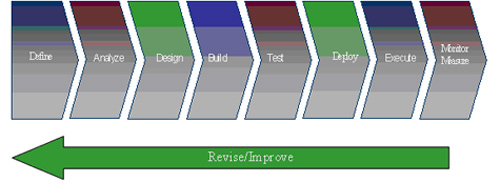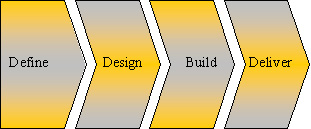Earlier this year I wrote an article outlining the critical relationship between the Process Life Cycle and the Project Life Cycle. This relationship, when treated as a partnership of equals, can improve the success of both the technical and the process improvement interests. In addition to the Project Life Cycle, there are two other important relationships that should be considered when developing or enhancing a business process. These are the Testing Life Cycle and the Training Life Cycle.
The commonly-accepted components of a Process Life Cycle are Define, Develop, Deploy, Execute, Monitor/Measure and Revise/Improve. To better show the relationship to the Training and Testing Life Cycles, the Develop phase of the Process Life Cycle is expanded to the next level of detail made up of four sub-phases: Analyze, Design, Build and Test. This expanded view is shown in Figure 1.

Figure 1 – Expanded Process Life Cycle (PrLC)
Although formalized and detailed testing had fallen out of favor with many organizations in recent years, this was often due to a misunderstanding of new development methodologies designed to shorten the time to deployment. The need to achieve a balance between timely deployment and meeting functionality and dependability requirements has reversed this trend somewhat. To achieve success when deploying new processes, an organization needs a robust test methodology that can be integrated with its Project and Process Life Cycles. A common Testing Life Cycle is shown in Figure 2.

Figure 2 – Testing Life Cycle (TLC)
The Define phase of the TLC begins when the process is being designed. This phase defines the scope of the testing that will be done and identifies the required overall results. In parallel with the Process Build phase, the Design and Build phases of the TLC creates the components needed to test the process. This may include writing test scripts that will be executed by an automated testing tool. Using an automated test tool in conjunction with a modeling/simulation tool provides the ability to electronically transfer the process data between tools saving time and eliminating potential errors. In other cases, test components may require building a physical environment in which to execute the process. One example might be a priority mail sortation process that would involve a combination of physical and mechanical steps.
The Process Test phase and the TLC Execute and Evaluate phases are where the two life cycles come together. Problems identified during the execution and evaluation of the test results could require the process be sent back to the Process Design and/or Build phase. It could also result in a decision to send the test component back to the Test Component Design and/or Build phase. The TLC Accept phase will provide confirmation that the process is performing as expected based on the process design. This confirmation will become one of the factors used to make the decision if and when to deploy the process.
Another key success factor for any project, whether it is implementing a system, a business process or both, is training. Training development has its own life cycle which needs to be integrated with the process life cycle. A Training Life Cycle is shown in Figure 3.

Figure 3 Training Life Cycle (TrLC)
Like the Testing Life Cycle, the Training Life Cycle begins during the Process Design phase. As the process is being designed, the scope and type of training that will be required is determined. Training material and delivery methods are selected to meet the specific needs identified. For example, should training be delivered by classroom instruction, individual on-the-job training or by providing material for self-study. The Training Build phase occurs in conjunction with the Process Build and Test phase. To avoid unnecessary duplication of effort, work procedure documentation created during the Process Build phase may be used as the basis for the training exercises created during the Training Build phase. Delivery of the training is performed as part of the Deploy phase of the Process Life Cycle and may occur before, during or after use of the process begins.
The relationships between the Process, Project, Testing and Training Life Cycles are summarized in Figure 4. Note that the Initiate and Close phases of the Project Life Cycle as well as the Monitor/Measure and Revise/Improve phases of the Process Life Cycle do not interact directly with other cycles.
 [
[
Figure 4 – Life Cycle Relationships
The level of detail for each Life Cycle phase should be tailored to the size and complexity of the business process and associated project. Taking the time to plan and integrate these life cycles can add value by reducing errors, avoiding duplication of effort, minimizing rework and ensuring that the new process is understood and correctly executed.
















